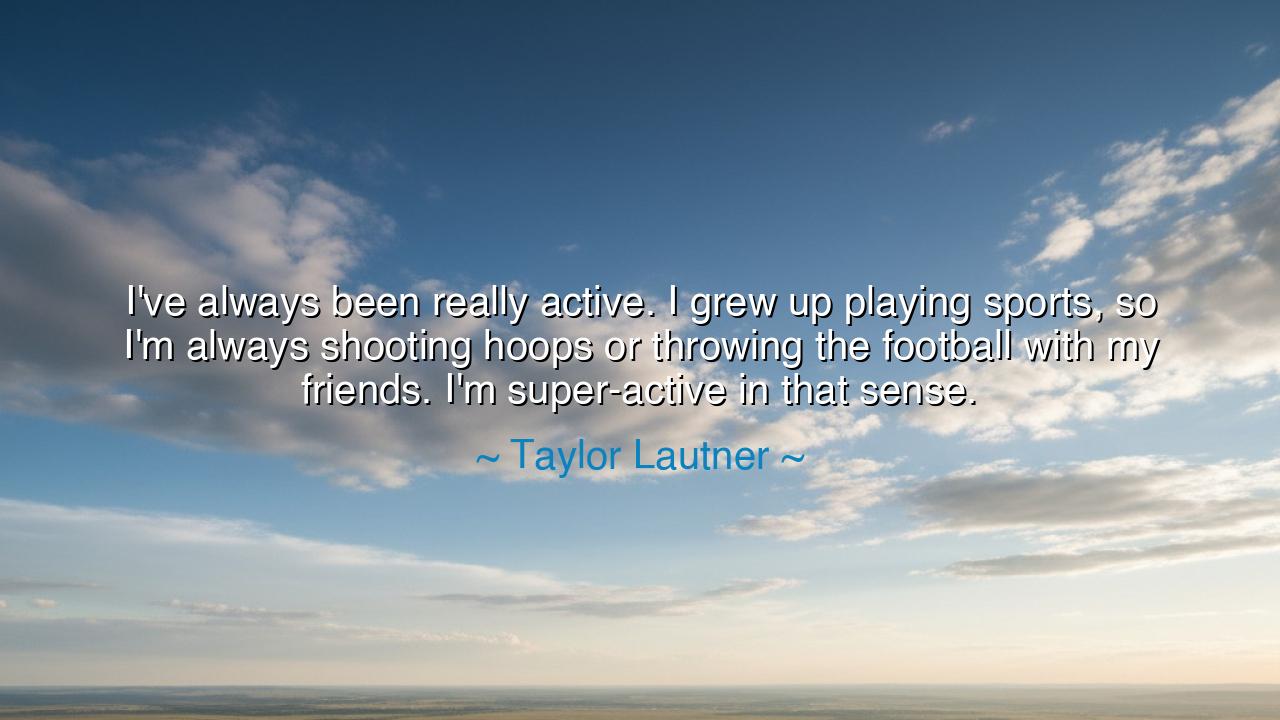
I've always been really active. I grew up playing sports, so I'm
I've always been really active. I grew up playing sports, so I'm always shooting hoops or throwing the football with my friends. I'm super-active in that sense.






From the dawn of humanity, movement has been at the core of our being, the very rhythm of life itself. Taylor Lautner, a man whose energy and vitality resonate in all his endeavors, speaks to this timeless truth when he says, “I’ve always been really active. I grew up playing sports, so I’m always shooting hoops or throwing the football with my friends. I’m super-active in that sense.” In these words, we hear the echo of the ancient warriors—those who knew that life was not to be lived passively, but through action, through movement, through engagement with the world around them. Lautner’s devotion to activity is not just a personal habit, but a reminder of the vital importance of staying active, of embracing physical vitality as a means of living life fully.
The ancients, from the Greeks to the Romans, understood well the power of physical activity. The Greeks, in particular, saw their athletes not only as symbols of strength but as paragons of virtue. The Olympic Games, held in honor of Zeus, were more than just competitions—they were acts of devotion, demonstrating the connection between the body and the soul. Lautner’s words echo this timeless understanding: the body is not merely a vessel, but a tool of expression, of strength, and of connection. Just as the ancient athletes trained their bodies to perform great feats, so too do modern warriors, like Lautner, engage in constant activity, not just to keep their bodies strong, but to cultivate the spirit of discipline and resilience.
Consider the great Hercules, whose legendary labors required not only strength but endurance, resilience, and the ability to adapt. Hercules’ very name became synonymous with strength because he never stopped moving, never stopped striving. His trials were tests not only of muscle but of spirit. In Lautner’s activities—shooting hoops, throwing the football, staying engaged with the physical world—there is a resonance with Hercules' myth. It is a reminder that strength is built not only in moments of triumph but in the quiet, everyday actions that keep the body sharp and the spirit unwavering.
And yet, Lautner’s quote speaks not only to strength, but to the joy of connection. In the ancient world, warriors did not fight alone; they fought alongside comrades, forging bonds of trust and camaraderie in the heat of battle. The great Spartan warriors, known for their unity and strength, were as much a brotherhood as they were an army. Lautner’s activities, from shooting hoops to throwing the football with friends, remind us of the power of movement in building relationships. Through shared activities, we grow closer to one another, strengthening not just our bodies but the ties that bind us as individuals. These moments of play, of engagement, are not distractions from life—they are the very essence of life itself.
In a world that often demands stillness—whether through the long hours at desks or the constant distractions of technology—Lautner’s commitment to being "super-active" stands as a testament to the importance of maintaining vitality. Just as the ancients revered the physical, recognizing that movement is life, so too must we recognize that activity is a cornerstone of health, happiness, and connection. It is in staying active, in embracing the body’s natural urge to move, that we honor the potential within ourselves. The act of playing sports, whether alone or with friends, is a sacred act—it reconnects us to the most primal parts of our being, to the joy of being alive, to the strength of the body, and to the joy of companionship.
Let us then take heed of Lautner’s example. The world can often become a place of stillness, of lethargy, where the spirit becomes dimmed by inactivity. To remain active is to honor the vitality of life, to embrace the energy that resides within us all. Whether we play sports, engage in exercise, or simply remain active in our daily lives, we must remember that movement is not just for the body—it is for the soul. Just as the ancient warriors trained tirelessly to maintain their strength, so must we commit to our own health and well-being, for it is through activity that we find the strength to face life’s challenges.
Therefore, let us live with intention. Let us remain super-active, not just in the physical sense but in the emotional and spiritual sense as well. Let us engage in life with enthusiasm, with purpose, and with strength. In doing so, we will cultivate the resilience, the joy, and the camaraderie that not only enriches our own lives but elevates those around us. For the true hero is not just one who conquers battles, but one who embraces the vitality of life, and who shares that vitality with the world.






AAdministratorAdministrator
Welcome, honored guests. Please leave a comment, we will respond soon